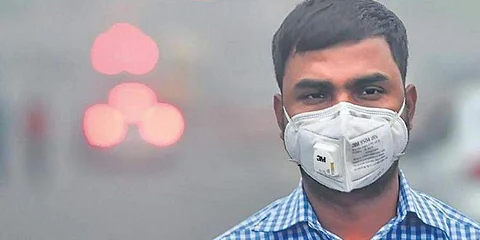

While buying a new face mask to protect yourself against COVID-19 infection, make sure you go for a three-layered mask as it is more effective than single or double-layered alternatives, health experts emphasised on Saturday.
According to the experts, additional layers in the mask may help us protect against SARS-CoV-2 by not letting the virus-laden contagious droplets or particles pass through the mask.
"COVID-19 is mainly spread through respiratory droplets that are made when someone who has contracted the virus through coughing, sneezing etc," Navneet Sood, Pulmonary Consultant, Dharamshila Narayana Superspeciality Hospital, told IANS.
"As we know that the layers of a mask helps in increasing its filtration power, it becomes crucial to wear a three-layered mask, so that we can protect ourselves from getting infected or infecting people around us," Sood added.
A team of researchers, including, Saptarshi Basu of the Indian Institute of Science, Bengaluru and Abhishek Saha from University of California - San Diego have shown, in a study, that three-layered surgical masks are most effective at stopping large droplets from a cough or sneeze from getting atomised into smaller droplets.
These large cough droplets can penetrate through the single or double-layered masks and atomise to much smaller droplets, which is particularly crucial since these smaller droplets (often called aerosols) are able to linger in the air for longer periods of time.
"While it is expected that large solid particles in the 500-600-micron range should be stopped by a single-layer mask with average pore size of 30 micron, we are showing that this is not the case for liquid droplets," said Saha.
"If these larger respiratory droplets have enough velocity, which happens for coughs or sneezes, when they land on a single-layer of this material it gets dispersed and squeezed through the smaller pores in the mask," he added.
For the study, published in the journal Science Advances, the team used a droplet generator and a high-speed time-lapse camera.
According to Centers for Disease Control and Prevention (CDC), while selecting a mask one should always go for masks -- with two or more layers of washable, breathable fabric, that completely cover your nose and mouth, that fit snugly against the sides of your face and don't have gaps.
"One should know that not all fabrics make for an effective mask. Also, some fabrics don't suit some skin types and how they are woven is another factor," said Shiba Kalyan Biswal, Consultant, Pulmonary and Sleep Medicine, Narayana Hospital, Gurugram.
"One should opt for masks with small pores as it may protect more against the virus by not helping virus-laden droplets or participles to pass through. After buying maintaining their cleanliness is also a key factor," Biswal added.
The health experts have also warned that we need to be more careful as cases of new Covid strains are gradually rising in the country.
They have expressed a number of possibilities which could be because of the lax attitude of people towards following the COVID protocols or the likeability of "mutations and new strains" causing the surge, as has been studied by the laboratories involved in the COVID detection across the country.
Various studies cited that a variant of SARS-CoV-2 that emerged in the UK -- B.1.1.7 -- in November 2020 is more transmissible than pre-existing variants and will lead to a large resurgence of Covid-19 cases.
The Union Health Ministry on Friday said that a total of 16,838 new cases of Covid-19 in the last one day pushed the tally to 1,11,73,761, and 113 died.
The Ministry also informed that 7,61,834 samples were tested on Thursday. The cumulative tests done by Indian Council of Medical Research (ICMR) so far stands at 21,99,40,742.
So far, 1,80,05,503 doses of corona vaccine have been administered in the country since the drive began on January 16 after approval for 'Covishield' and 'Covaxin'.
